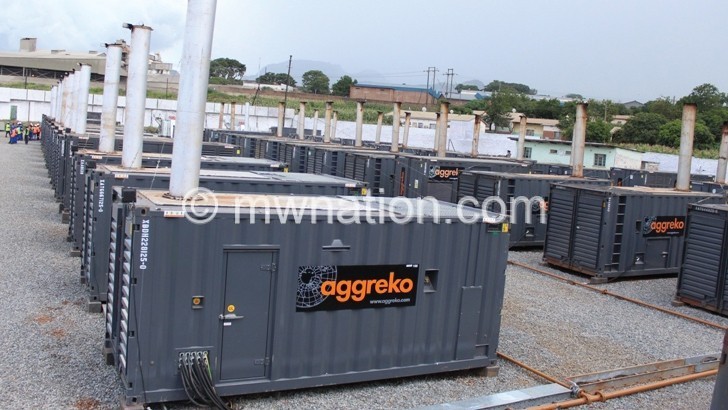Escom set to assess Aggreko power deal
Electricity Supply Corporation of Malawi (Escom) says it will review whether to extend or terminate the Aggreko diesel power generators deal before expiry of the current contract in April.
Escom contracted Aggreko, an independent power producer, as a stop-gap measure to electricity blackouts and to provide backup particularly during peak hours.

With the coming of 60 megawatts (MW) solar power from JCM Power in Salima, it was expected that Escom will terminate the Aggreko deal in favour of cheaper power supply.
In an interview last week, Escom board chairperson Frederick Changaya said the power supplier will analyse the situation.
He said: “In the first place as a new board, we acknowledged that the Aggreko deal was expensive.
“Initially the previous board approved a three-year deal, but as a new board with an approval from the Cabinet committee agreed and approved one-year deal which will end in April.”
Changaya said Escom was still assessing the effectiveness of JCM solar power to see whether it is reliable.
When the Aggreko deal was first awarded in 2017, documents showed that it could cost Escom roughly K57 billion over two years, a bill experts said was unsustainable and could push electricity tariffs beyond the reach of the majority of Malawians.
Consumers Association of Malawi executive director John Kapito said in an interview last week that the Aggreko contract remains a mystery to consumers considering its cost and effectiveness.
He said amid the current economic hardships, consumers do not need Aggreko’s exorbitant power unless someone has a good reason.
“We are told that they added more megawatts to our power generation and yet Aggreko is still here consuming a lot of diesel and we are paying high tariffs,” Kapito said.
In the deal, Aggreko is providing 84 generators with a combined capacity of 78MW.
The generators are stationed at Chichiri in Blantyre (30MW), Kanengo in Lilongwe (25MW) and Chinyama in Kasungu (23MW).
Figures from the Ministry of Energy show that the three diesel-powered plants consume a combined 161 834.40 litres of diesel per day.
The breakdown is as follows: Chichiri plant (72 618 litres, Kanengo plant (41 494 litres) and Chinyama plant (47 720 litres).





